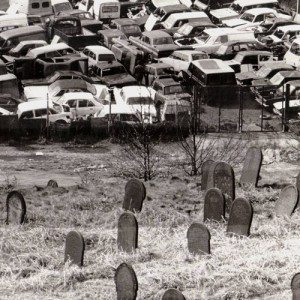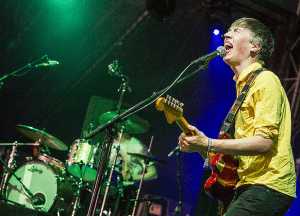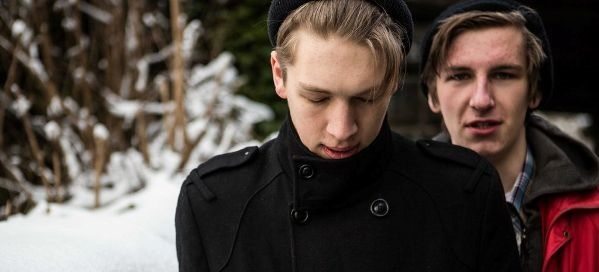Drenge
 Rarely does a name with so little conventional meaning say as much as “Drenge”. Without even knowing anything about the band, its moniker makes it clear that there are two things which this group will certainly not be: clean and quiet. I spoke to Rory Loveless from the band earlier this month to discuss the new record and what they have lined up for summer.
Rarely does a name with so little conventional meaning say as much as “Drenge”. Without even knowing anything about the band, its moniker makes it clear that there are two things which this group will certainly not be: clean and quiet. I spoke to Rory Loveless from the band earlier this month to discuss the new record and what they have lined up for summer.
The music of Drenge reeks of trying to defy traditional British guitar rock influences. Listening to their debut album, one would far sooner be reminded of the work of The Black Keys or The White Stripes as opposed to Britpop acts: not quite the sounds expected from the band’s origins just outside of Sheffield. As with their aforementioned bluesy influences, Drenge consists of only two members: Rory Loveless (drums) and his older brother Eoin (vocals and guitars).
Musical siblings have a reputation for not always getting on perfectly, and Rory is aware of the potential strain which bands can have on relationships. He claims that both brothers were encouraged by their parents to engage with music, so there is clearly no sense of frittering on that front, and in terms of personal relations between the two, Rory admits they tend to not spend much time together when not focusing on band activity. (At the time of this interview, the brothers have gone two days without each other’s company.) Thankfully, this attempt by each sibling not to become too involved with the other has not affected the effervescent chemistry of the music itself, and the energy of their self-titled record pops and fizzes even more intensely from the band’s reduced headcount.
As an album, Drenge has something of an unorthodox construction behind it. What began as a series of sessions for an EP back in September 2012 soon expanded once a deal solidified with Infectious Music UK, prompting the conception of an entire full-length LP. While this move could easily have left Drenge feeling disjointed and lacking in cohesion, the unique sound of the two-piece means the result is quite the opposite. It seems unusual for a record with such a seemingly ramshackle assemblage to boast such a consistent sound, but recording between multiple studios across varying periods of time does not seem to have allowed the quality of Drenge to dip at any point. Early singles ‘Bloodsports’ and ‘Backwaters’ never feel half-baked, despite the original session recordings remaining on the record.
Any stragglers who stumble bleary-eyed into one of their festival shows will walk away as revitalised as if they had just downed several strong espressos.
Scuzzy guitars and frenetic drumming keep the pace of the album relentless, and it doesn’t let up for the entirety of 37 minutes. If there is one thing it cannot be said that the members of Drenge are lacking in, it would be cojones. The intense energy captured on their debut seems perfect for taking on the road, and the excitement of touring the festival circuit is wholly apparent when in discussion with Rory himself. He reflects that both brothers enjoy the different energy provided by early timeslots at festivals, believing that mid-afternoon sets allow them further room to experiment with their live approach. He firmly believes that any stragglers who stumble bleary-eyed into one of their festival shows will walk away as revitalised as if they had just downed several strong espressos. When asked if there are any festivals he is particularly excited to be playing at this year, there were name-checks for Beacons and Bestival, though that is really the tip of the iceberg in terms of how many shows the Loveless duo have lined up.
Touching on the band’s political endorsement from MP Tom Watson (which they aren’t overly keen to spend much time discussing), Rory is aware that plenty of acts have fallen foul of the approval of The Man, and is firm not to repeat such follies. I asked which political figure he would most like to have endorse Drenge’s music, and after much umming and erring about various opinions on the Royal family and Northern Ireland, Rory eventually settled on Nelson Mandela. An agreeably safe choice, and one which suggests that these are two musicians very wary of dipping their toes into political waters.
 Drenge’s first record does not have any intention of overstaying its welcome, with only one of its first six songs clocking in at over three minutes in length. The album stands up well to repeat listens in spite of its short runtime: the new single ‘Face Like a Skull’ stands out as a particularly impressive track, with its shredding guitars being particularly reminiscent of Queens of the Stone Age on this occasion. While it is the case that the album’s sound has a little trouble carrying across the entirety of its runtime without dragging slightly, this is less so than initial impressions of this band may have led casual listeners to believe. Drenge make their sound go further than seems possible, though the entire LP is still a slight stretch. It should also be noted that the closing ‘Fuckabout’ feels incredibly tacked-on in the wake of the perfect conclusion of ‘Let’s Pretend’, and plays much like a bonus track rather than an official entry.
Drenge’s first record does not have any intention of overstaying its welcome, with only one of its first six songs clocking in at over three minutes in length. The album stands up well to repeat listens in spite of its short runtime: the new single ‘Face Like a Skull’ stands out as a particularly impressive track, with its shredding guitars being particularly reminiscent of Queens of the Stone Age on this occasion. While it is the case that the album’s sound has a little trouble carrying across the entirety of its runtime without dragging slightly, this is less so than initial impressions of this band may have led casual listeners to believe. Drenge make their sound go further than seems possible, though the entire LP is still a slight stretch. It should also be noted that the closing ‘Fuckabout’ feels incredibly tacked-on in the wake of the perfect conclusion of ‘Let’s Pretend’, and plays much like a bonus track rather than an official entry.
On the whole, however, Drenge have far more depth than a first listen would have one believe, and the Loveless brothers have created a debut which rewards repeat listens in a manner that is not normally associated with this style of guitar shredding. It’s no mean feat drawing longevity from visceral directness, and as such, this is certainly a band well worth your time.
Similar To: The Black Keys, Queens of the Stone Age
MP3: ‘Bloodsports’, ‘Backwaters’

Comments